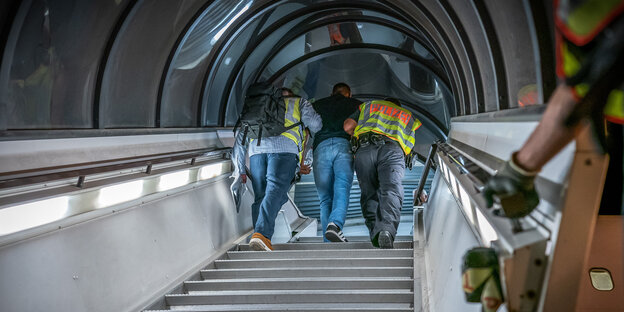The deportation supervisor at Hamburg Airport has published its annual report. It's hard to bear. But it's good that it exists.

If necessary, with coercive measures: deportations by plane, here in 2019 at Leipzig-Halle Airport Photo: Michael Kappeler/dpa
Screaming children, trembling parents, authorities who consider a deportation reasonable three days after a suicide attempt and doctors who inject deportees against their will and make discriminatory comments about them: the annual report of the Hamburg Deportation Observatory was published on Tuesday. This is, once again, an excerpt from flagrant situations of deportations through Hamburg airport. And as difficult as some of the descriptions in the 32-page report are to read, it's a good thing it exists.
The position of Hamburg deportation observer, which Merle Abel has held since the end of last year, is financed by the red-green Hamburg Senate. He is allowed to be present at the airport during the deportations, observe them and speak with the responsible police, the doctors and, above all, with those affected.
But she is not allowed to intervene. And she is not there either if something happens beforehand, for example when you are picked up from a deportation center or during the flight. Subsequently, the observer analyzes situations that are worth discussing with authorities, politicians and the police. As a rule, this means: when people have been deported a long time ago. And the observer cannot force state authorities to hold more than one meeting.
The current annual report focuses on the performance of medical professionals
One can certainly see the paper as a toothless tiger, a fig leaf of inhumane deportations. But what would the public know without publication about the practice of deportation in a secluded area of the airport?
Dramatic details of state coercive measures
And thanks to regular observation, previously ignored aspects can open new discussions. Until now, deportations have focused solely on the actions of the authorities, the police or those affected. The current annual report focuses on the actions of medical professionals, that is, it analyzes medical care during deportations. And according to the observer, this “raises many questions.”
For example, when doctors present during deportation resort to forced medication, as the monitoring report shows. Ultimately, this can only take place under strict legal conditions. But is the administration of a sedative against the will of the interested party permitted within the framework of the requirement of not endangering the safety of the flight?
Or bodily harm, especially if the doctor gives him an injection in the thigh while he defends himself from being restrained by four police officers in his plane seat?
Legally it is difficult to say, but based on these observations, a brochure should now be created for doctors involved in deportations in order to raise their awareness. Given the terrible deportation practices in Europe, this is certainly no great achievement. But: without the deportation observer, what would you, as an unaffected person, know about the dramatic details of a state coercive measure?